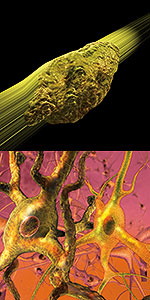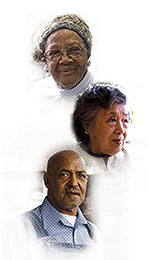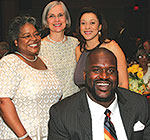PianoramaStudents in UAB's Department of Music celebrated the purchase of 32 Steinway pianos with a "pian-a-thon"—practicing and performing on a seven-foot concert grand piano for 32 hours straight. The purchase makes UAB an "all-Steinway school," a prestigious designation shared with the Juilliard School and only 71 other schools worldwide. |
|
Nerve CenterNEUROFIBROMATOSIS (NF) is a hereditary condition that causes tumors to grow on nerve tissue, sometimes leading to deformity, scoliosis, speech impairment, blindness, and even cancer. Now a $5.7-million Department of Defense grant will enable a team of UAB geneticists, doctors, and biostatisticians to study NF and test new treatments. The support also extends the work of the NF Consortium, a collaboration among nine institutions coordinated by UAB to conduct clinical trials and discover new solutions for the disease. "We expect results from the NF Consortium studies to provide a wide range of therapeutic options for patients, with the goal of reducing the rates of tumor growth and improving quality of life," says Bruce Korf, M.D., Ph.D., chair of the UAB Department of Genetics and an NF expert. |
 |
Full Court PressCharles Barkley wasn't alone when he returned to Birmingham to host another gala for UAB's Minority Health Research Center (MHRC). Fellow NBA superstar Shaquille O'Neal joined him to promote the center's efforts to eliminate racial health disparities. The duo actively champion health improvement: Barkley set up a fund to support MHRC research, training, and community outreach; O'Neal has been challenging children and schools nationwide to eat healthier food and exercise. |
|
Bridging the GapsHEALTH CHANGES ASSOCIATED WITH AGING are a fact of life, but health disparities don't have to be. The National Institutes of Health (NIH) has awarded $2.7 million to create the Deep South Resource Center for Minority Aging Research (RCMAR), aimed at reducing health disparities for older African Americans. Along with the University of Alabama, Tuskegee University, and Morehouse School of Medicine, UAB will support faculty development and conduct research related to rural elders, new prevention and treatment interventions, discrimination, and bioethical issues. Richard Allman, M.D., director of UAB's Center for Aging and lead investigator on the grant, hopes it "will ultimately become not only a regional but also a national resource" for expertise related to health disparities between older African Americans and whites. AN ADDITIONAL $13 MILLION for three other initiatives will help UAB researchers promote preventive care for all ages: The National Cancer Institute's Minority Institution/Cancer Center Partnership program grants $5 million each to UAB, Morehouse, and Tuskegee to aid education, outreach, and research efforts in underserved areas. The $4.2-million REACH US grant from the Centers for Disease Control and Prevention will make UAB a "national clearinghouse" for strategies to help communities increase breast and cervical cancer screening among African-American women. The NIH also awarded $4.5 million for further development of UAB's Minority Health and Research Center. These projects will help UAB "continue feeding a culture of collaboration that cuts across all racial, ethnic, and socioeconomic barriers," says Mona Fouad, M.D., the center's director and co-principal investigator for the RCMAR and the other initiatives. |
 |
Riding High Against ArthritisUAB MUSCULOSKELETAL DISEASE research will keep moving—and moving closer to new treatment options—thanks to recent grants:
|
 |

